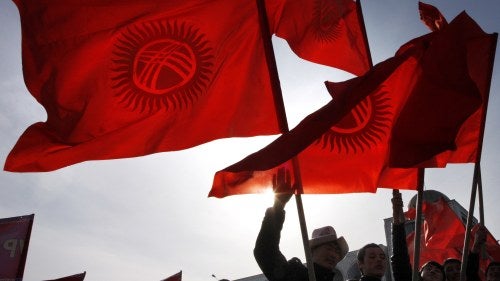Chicago's Kyrgyz community is growing, and so is its economic impact

The Kyrgyz community in Chicagoland is small, but its economic footprint is expanding. New Kyrgyz businesses in the service industry, logistics, and shipping are bridging Illinois and Central Asia.
The Kyrgyz community in Chicagoland may be small, but its economic footprint is expanding. The Kyrgyz Community Center in Arlington Heights has become a hub of economic and cultural exchange for Chicago and its northern suburbs. And as the Kyrgyz community here develops, so do Illinois’ ties to Kyrgyzstan.
Last August, Kyrgyzstan opened up a new Consulate General in Chicago to serve the growing Kyrgyz community. Nurdin Mamatzhan, president of the Kyrgyz Community Center, says the Consul General is at every event the center hosts.
In November, Baktybek Amanbaev, Kyrgyzstan’s ambassador to the United States and Canada, traveled to Rolling Meadows to celebrate the opening of a new Central Asian restaurant. He also met with two members of Illinois’ congressional delegation to talk about economic connections between Illinois and Kyrgyzstan, and potentially arrange a discussion at the community center between members of Congress and Kyrgyz citizens.
Without reliable statistics, it’s been difficult to estimate the size and characteristics of the Kyrzygz community, but Mamatzhan said when he first came to Chicago, in 2011, Kyrgyz people had a much smaller footprint. Today, he estimates the community is about 10,000 and growing.
This year, the U.S. Census Bureau added a “Kyrgyz” category to its community surveys. Mamatzhan believes the growth in Kyrgyz immigration has been fueled in part by Kyrgyz people leaving Russia because they fear being drafted into Moscow’s war with Ukraine. As a sanctuary city, Chicago has been a desirable destination for migrants and asylum seekers.
There was no community center and only a couple Kyrgyz restaurants in the Chicago area when Mamatzhan first came to the city. At the time, many recent arrivals from Kyrgyzstan, he said, drove for cab companies or rideshare services. Some found jobs with trucking companies.
Now, Kyrgyz migrants are starting to open their own businesses, especially in shipping, automotive repair, and the service industry, he said.
Mamatzhan explained that Kyrgyz people, like Midwesterners, value friendliness and hospitality. That’s helped the community build a network of mutual support in the Chicago area. As early Kyrgyz migrants have found more secure economic footing, they’ve had more resources to rent and share with newer arrivals, including apartments, vehicles, and jobs.
Mamatzhan sees progress in the general community too, as they learn more about Kyrgyz people.
“Maybe they don’t know about us yet,” said Mamatzhan. “But I think, in some cases, they’re learning about us.”
This story first appeared in the ChicagoGlobal newsletter, a joint project of Crain's Chicago Business and the Chicago Council on Global Affairs.

